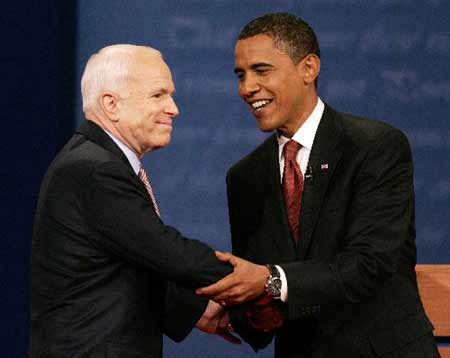US presidential candidates John McCain and Barack Obama clashed over economy and foreign policy during their first presidential debate in Oxford, Mississippi, on Friday night.
Republican McCain said that another attack on the scale of the September 11, 2001, hijackings was "much less likely" now than it was the day after the terrorist attacks.
"America is safer now than it was on 9/11," he said. "But we have a long way to go before we can declare America safe."
 |
|
US Republican presidential candidate John McCain (L) and US Democratic presidential candidate Barack Obama meet as they walked on stage during the first US presidential debate at the University of Mississippi in Oxford, Mississippi, September 26, 2008. [Xinhua/Reuters Photo]
|
Obama, his Democratic rival for the White House, agreed that the United States was "safer in some ways" but said the country needed to focus more on issues such as nuclear nonproliferation and restoring America's image in the world.
McCain also said Iranian nuclear weapons would be an "existential threat to the state of Israel", and called for a new "league of democracies to stand firm against Iran".
"We cannot allow another Holocaust," he added.
Obama agreed that the United States "cannot tolerate a nuclear Iran", calling for tougher sanctions from a range of countries.
On Iraq, McCain said that the war had been badly managed at the beginning but that the United States was now winning thanks to a "great general and a strategy that succeeded."
Obama blasted McCain as having been wrong about the war at the start, saying McCain had failed to anticipate the uprising against US forces and violence between rival religious groups in the country.
Before moving into foreign policy, the candidates focused on the economy.
McCain said he would consider a spending freeze on everything but defense, veterans affairs and entitlement programs in order to cut back on government spending.
Obama disagreed, saying, "the problem is you're using a hatchet where you need a scalpel."
He agreed that the government needed to cut spending in some areas, but he said other areas, such as early childhood education, needed more funding.
McCain and Obama also tangled over who would cut taxes more.
McCain said he would lower business taxes in order to encourage job growth in the United States, and Obama said he would cut taxes for 95 percent of American families.
Obama also said that the United States was facing its worst financial crisis since the Great Depression.
McCain said he was encouraged that Republicans and Democrats were working together to solve the crisis.
The first 30 minutes of the debate focused on the economy, even though the debate was supposed to be centered on foreign policy. The economy has dominated the campaign trail for the past two weeks.
According to CNN's average of national polls, Obama holds a five-percentage point lead over McCain, 48 percent to 43 percent.
The 9 percent of respondents who are undecided could swing the election either way.